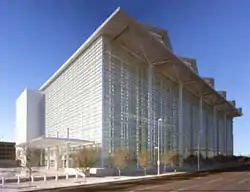Sandra Day O'Connor United States Courthouse
The Sandra Day O'Connor United States Courthouse is a courthouse at 401 West Washington Street in Phoenix, Arizona. Pursuant to Pub. L.Tooltip Public Law (United States) 106–166 (text) (PDF), enacted by the United States Congress, it is named after Sandra Day O'Connor, who served as an Associate Justice of the Supreme Court of the United States from September 21, 1981, to January 31, 2006.
| Sandra Day O'Connor United States Courthouse | |
|---|---|
 | |
| General information | |
| Status | Completed |
| Type | Courthouse |
| Address | 401 West Washington Street |
| Town or city | Phoenix, Arizona |
| Country | United States |
| Coordinates | 33°26′52″N 112°4′50″W |
| Current tenants | • United States Court of Appeals for the Ninth Circuit • United States District Court for the District of Arizona |
| Inaugurated | October 2000 |
| Cost | $123 million[1] |
| Technical details | |
| Floor count | Six |
| Floor area | 550,000 square feet (51,000 m2) |
| Design and construction | |
| Architect(s) | • Richard Meier[1] • Langdon Wilson Architecture |
| Other information | |
| Parking | No public parking |
Description
The building is home to the United States District Court for the District of Arizona, and also hosts Circuit Judges William C. Canby Jr.; Michael Daly Hawkins; Mary H. Murguia; Mary M. Schroeder; Andrew D. Hurwitz; and Barry G. Silverman of the United States Court of Appeals for the Ninth Circuit.
Built at a cost of $123 million[1] and dedicated in October 2000, the building was championed by Senior United States District Judge Robert C. Broomfield. It was designed by architect Richard Meier,[1] with local executive architects of Langdon Wilson Architecture in Phoenix. The building is in Meier's signature monochrome style. Standing six stories tall, it encompasses more than 550,000 square feet (51,000 m2). The building's public atrium features a six-story glass curtain wall on the north face, and contains a drum-shaped special-proceedings courtroom with a glass-lens ceiling, the work of James Carpenter, an American light artist and designer. There is no public parking.
Climate-control problems
Although part of the General Services Administration's initiative to bring design excellence to public buildings, the building has been plagued with climate-control problems with its evaporative-cooling system. Temperatures in the atrium have been known to reach 100 °F (38 °C) in the summer, and the ceiling was open to dust storms, but now motorized louvers prevent infiltration during storms.
References
- Santos, Fernanda (August 4, 2012). "Where Indoors Can Become Too Much Like Outdoors". The New York Times (via the Pittsburgh Post-Gazette). Retrieved August 6, 2012.
- Meier, R. & Frampton, K. & Rykwert, J. & Holl, S. (2004). Richard Meier Architect. New York City: Rizzoli International Publications, Inc. Page 174. ISBN 978-0-847-82702-2.
